Newsom and Ammiano unite on San Francisco universal
health care
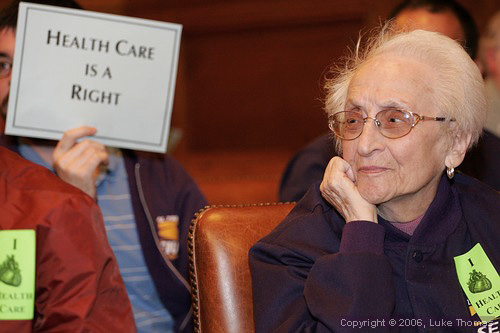
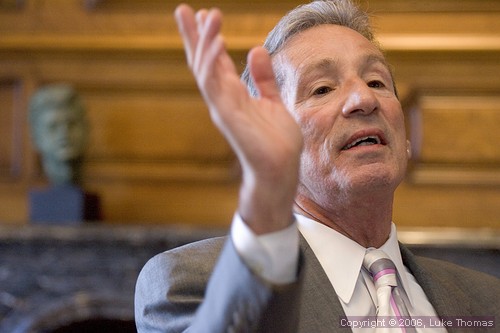
Supervisor Tom Ammiano explains need for collaboration on health
care plan despite holding Board of Supervisors veto-proof majority
backing for funding mandate.
Photo(s) by
Luke Thomas
By Pat Murphy
July 12, 2006
The two chief architects of workable universal health care shook
hands in agreement Tuesday, de facto and by force of will making
the unique San Francisco program launch a certainty next July.
Workable because Supervisor Tom Ammiano and Mayor Gavin Newsom
persevered to acceptable agreement setting the stage for both
branches of City government to fully cooperate rather than resist
implementation.
"This would not have happened if it had not been for Supervisor
Ammiano's extraordinary willingness to work together," Newsom
reflected.
Ammiano returned, "How much better it is to have the cooperation
and the involvement (of the Mayor's Office). If there's no cooperation
from departments, if there's no good faith effort, the thing could
never get off the ground."
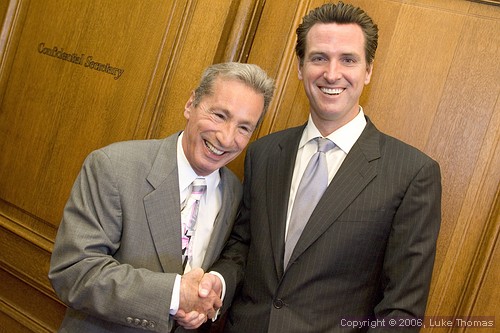
Supervisor Tom Ammiano, left, and Mayor Gavin Newsom seal the
deal
following a press briefing for reporters stationed at City Hall.
Newsom agreed, noting the District 9 supervisor did not need
the mayor's backing.
Nine members of the Board of Supervisors had given veto-proof
support to the Workers Healthcare Security Act (WHSA) authored
by Ammiano.
"I think what the Supervisor has done with his willingness,
in spite of eight co-sponsors, to work together on the mandate
with this office, is a desire that we actually executed and implemented
in an appropriate manner so that he doesn't have to call hearings
every week saying, 'Mitch (Katz, Director of the Health Department)
isn't implementing it, Controller's not, the rest of us aren't,'
" Newsom explained.
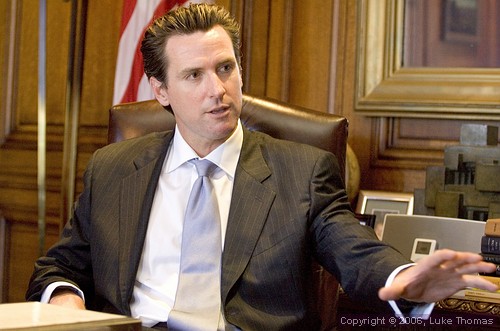
"There is a fundamental here where Supervisor Ammiano and
I are not going to deviate and that is an obligation to provide
a strategy to provide health care for 82,000 people where everybody
participates - employee, employer, and government," Newsom
recognized.
"That's to me the real victory, that have all agreed on
that principle and that is a big deal because it is simply without
precedent."
Newsom and Ammiano made the remarks in a 1:00 p.m. briefing for
the City Hall press corps which followed a morning hearing on
the issue before the Budget and Finance Committee of the Board
of Supervisors.
It was the 16th public hearing before the committee on universal
health care, Committee Chair Chris Daly pointed out, with one
more hearing set Monday at 1:00 p.m. to finalize WHSA amendments.
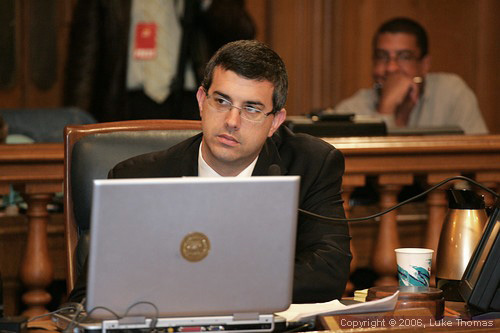
Supervisor Chris Daly leads the Budget and Finance Committee hearing
Tuesday
on universal health care delivery in San Francisco.
Ammiano presented two substantive amendments unanimously adopted
yesterday by the five-member committee.
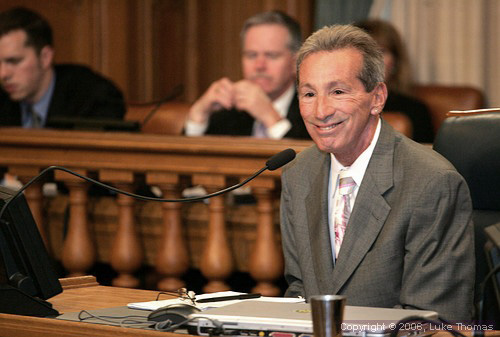
District 9 Supervisor Tom Ammiano delivers final amendments
to the Budget and Finance Committee.
In addition, the committee announced its intention to merge WHSA
and the mayor's plan into one piece of legislation.
Amendments include preventing workers who already have health
insurance through a spouse's coverage from SFHAP enrollment, and
increasing the number of hours which employees must work to qualify
for the plan.
Beginning in July, 2008, to qualify employees must work a minimum
of 12 hours weekly raised from previous requirement of two hours
per week. Weekly work requirement drops to 10 hours in 2008, and
to nine hours weekly in 2009.
Ammiano announced the amendments as agreed by his office and
the Mayor's Office.
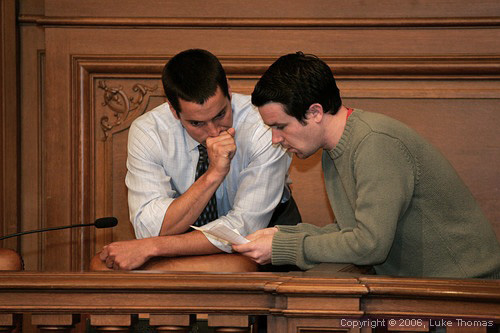
Wade Crowfoot, left, the mayor's liaison to the Board of Supervisors
in consultation Tuesday with Zach Tuller, legislative aide to
Supervisor Ammiano.
By City Charter, the mayor or the mayor's liaison have a voice
on the floor
of the San Francisco Board of Supervisors.
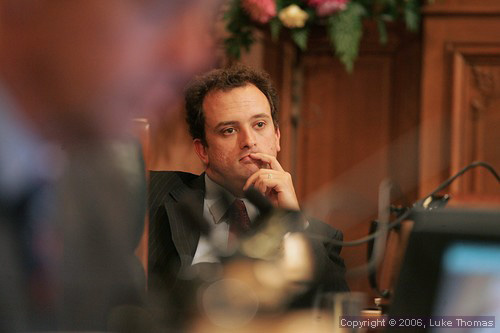
Committee member Sean Elsbernd
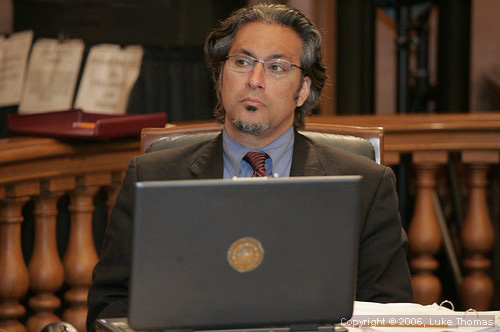
Committee member Ross Mirkarimi
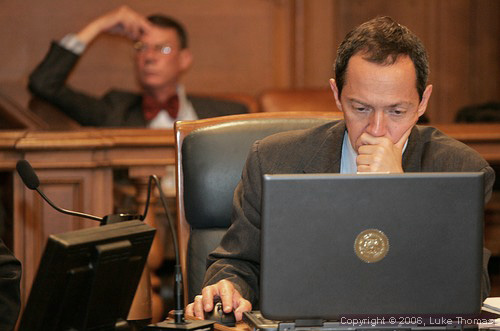
Committee member Bevan Dufty
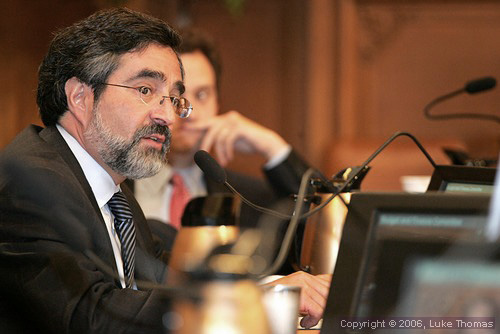
Committee member and president of the San Francisco Board of Supervisors
Aaron Peskin
Newsom's plan, known as the San Francisco Healthcare Access Plan
(SFHAP), originally was separate from SWHA legislation, but dependent
on SWHA for creating an employer contribution funding floor.
The SWHA required employer contribution came to be known as 'the
mandate' component of San Francisco health care access for 85,000
uncovered workers.
If all 85,000 workers enroll in SFHAP total first-year costs
are estimated at $198 million, a projection made by Dr. Mitch
Katz, Director of the San Francisco Health Department.
Ammiano agreed to co-author SFHAP with Newsom following creation
by the Universal Healthcare Council (UHC) convened by Newsom in
November. Some 125 stakeholders participated on UHC collaboration,
including labor and business representatives as well as elected
officials representing divergent interests.
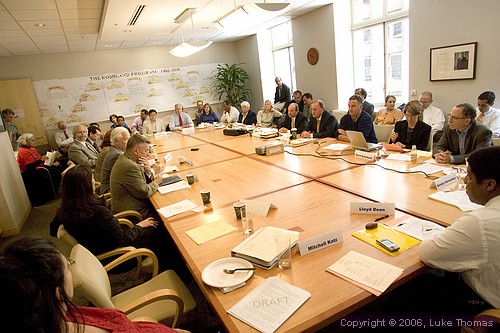
Total first-year costs are estimated at $198 million
if all 85,000 eligible San Francisco workers enroll in SFHAP,
a figure determined by Dr. Mitch Katz, Director of the San Francisco
Health Department.
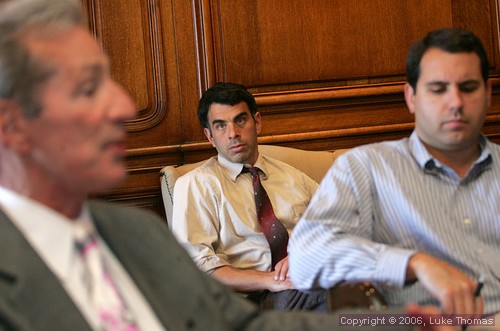
Dr. Mitch Katz, center, attends press briefing.
San Francisco Chronicle reporter Charlie Goodyear at right.
Some $28 million would be raised by mandated employer contributions,
with $10 million provided by federal and state funding. An additional
$56 million is estimated from worker co-payments ranging from
$3 to $201 monthly. The $104 million now being spent on public
health care would be reshaped to SFHAP delivery format.
No one would be required to enroll in SFHAP although the incentive
to do so is great.
Those choosing not to enroll would receive a full-cost bill for
public medical services. Workers already receiving health care
coverage through a spouse's plan would not be able to double their
coverage through SFHAP enrollment.
The legislation requires businesses with more than 50 employees
to contribute $1.60 per hour worked by employees beginning in
July, 2008. It caps employer contribution at $180 per month per
worker.
During the first three years of the plan additional SFHAP funding
would be held to a five percent increase. Businesses with from
20 to 50 workers would pay $1.06 per hour starting July, 2009.
The Board of Supervisors will vote on the finalized measure at
its 2:00 p.m. meeting Tuesday.
Passage begins one year of preparation for implementation, which
provides for revision based on business and worker needs during
that time.
With passage appearing certain, the innovative program already
is receiving study by city and county governments nationwide,
both Ammiano and Newsom noted.
Ammiano described creation of a workable universal health care
plan has having broader impact than any achievement in his multi-decade
service in San Francisco governance.
He has been in public life since the 1970s, first as elected
member of the San Francisco School Board, elected member of the
San Francisco Board of Supervisors, and president of the Board
of Supervisors. He led creation of the first domestic partnerships
legislation.
"Domestic partners... set a very important worldwide stage
but I think this is even more comprehensive than that," Ammiano
told the Sentinel.
"Even that as heady times as that was when we got that passed...
this is wider in scope and had a lot more cooperation and interaction
with the Mayor's Office."
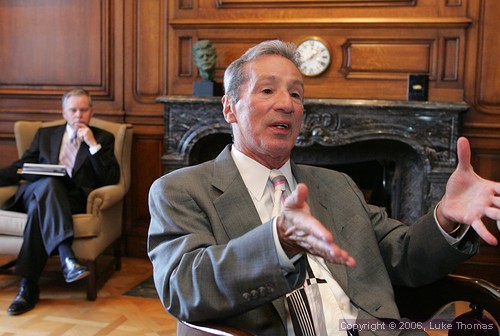
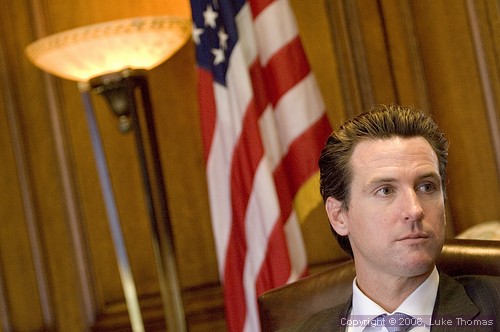
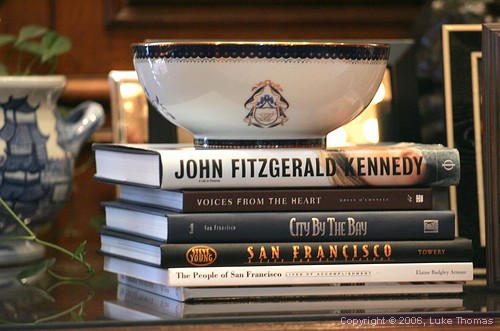
####
|